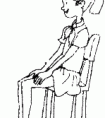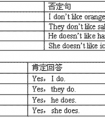用所给单词的正确形式填空。1. I ___________ (be)late for school yesterday.2. He always ____________ (go) to bed late.3. How about ____________ (read) books t-六年级英语
第一人称
第二人称
第三人称
形容词性物主代词
my
your
his
her
its
our
your
their
名词性物主代词
mine
yours
his
her
its
ours
yours
theirs
汉语意思
我的
你的
他的
她的
它的
我们的
你们的
他(她它)们的
This is her dress. / This dress is hers.
物主代词的用法:
物主代词既有表示所属的作用又有指代作用,例如:
John had cut his finger; apparently there was a broken glass on his desk.
约翰割破了手指,显而易见,他桌子上有个破碎的玻璃杯。
物主代词有形容词性(my, your等)和名词性(mine, yours等)两种,形容词性的物主代词属于限定词。
名词性的物主代词在用法上相当于省略了中心名词的 --'s属格结构,例如:
Jack's cap 意为 The cap is Jack's.
His cap 意为 The cap is his.
名词性物主代词的句法功能:
a. 作主语,例如:
May I use your pen? Yours works better.
我可以用一用你的钢笔吗? 你的比我的好用。
b.作宾语,例如:
I love my motherland as much as you love yours.
我爱我的祖国就像你爱你的祖国一样深。
c.作介词宾语,例如:
You should interpret what I said in my sense of the word, not in yours.
你应当按我所用的词义去解释我说的话,而不能按你自己的意义去解释。
d.作主语补语,例如:
The life I have is yours. It's yours. It's yours. 我的生命属于你,属于你,属于你。
物主代词的意思是物品主人的代词。
| 人称代词 | 第一人称单数 | 第二人称单数 | 第三人称单数 | 第一人称复数 | 第二人称复数 | 第三人称复数 |
| 主格 | I | you | he/she/it | we | you | they |
| 宾格 | me | you | him/her/it | us | you | them |
| 汉语 | 我 | 你 | 他 | 我们 | 你们 |
他/她/它们 |
| 形容词性物主代词 | my | your | his/her/its | our | your | their |
| 名词性物主代词 | mine | yours | his/hers/its | ous | yours | theirs |
| 汉语 | 我的 | 你的 | 他的/她的/它的 | 我们的 | 你们的 | 他/她/它们的 |
考点名称:副词的比较级
- 副词比较级:
副词和形容词一样,也有原级、比较级和最高级三个等级。
其构成方式有规则变化和不规则变化两种情况。
A、一般副词变为比较级其后直接加er,以e结尾的直接加r。
B、辅音字母+y结尾的,变y为i再加er;
重读闭音节词词尾只有一个辅音字母,双写辅音字母,再加er。
C、双音节词和多音节词,在词前直接加more。
D、不规则变化的副词:
badly → worse,far → farther(表距离),far → further(表程度)
well → better, little → less,much → more 副词比较级的用法:<?xml:namespace prefix = "o" ns = "urn:schemas-microsoft-com:office:office" />
1)单独使用:
Try to do better next time. 下次争取干好一点。
I had seen the film only a few days earlier. 我是几天前才看的这部电影。
He’ll come back sooner or later. 他迟早会回来的。
2)和than一起使用:He swims better than I do. 他游泳游得比我好。
He works less than he used to. 他工作的时间比以前少了。
Can you do any better than that? 你能不能干的好一些?
3) 比较级前可有状语修饰:You must work much faster. 你必须大大加快干活的速度。
He walked no further. 他没在往前走。
She could dance even more gracefully than a dancer. 她能比舞蹈演员跳的更美。
Helen came late, but her sister came still later. 海伦来晚了, 而她妹妹来得更晚。
考点名称:副词
- 副词:
用来修饰动词、形容词、其他副词或全句的词,表示时间、地点、程度、方式等。 - 分 类:
1) 时间和频度副词:
now,then,often,always,usually,early,today, lately, next,last,already,generally,frequently, seldom,ever,never,yet,soon,too, immediately, hardly,finally,shortly, before, ago,sometimes, yesterday.
2) 地点副词:
here, there, everywhere, anywhere, in, out, inside, outside, above, below, down, back, forward, home, upstairs, downstairs, across, along, round , around, near, off, past, up, away, on.
3) 方式副词:
carefully, properly, anxiously, suddenly, normally, fast, well, calmly, politely, proudly, softly, warmly
4) 程度副词:
much,little, very,rather,so,too,still, quite, perfectly, enough, extremely, entirely,almost, slightly.
5) 疑问副词:
how, when, where, why.
6) 关系副词:
when, where, why.
7) 连接副词:
how, when, where, why, whether. 副词的位置:
A、副词修饰动词(包括动名词和分词)时,通常位于被修饰动词的后面。
例:Shestudieshard.她学习努力。
B、副词修饰形容词是,通常放在该形容词的前面。
例:LiMingistooyoung.Hecan’tcarrytheheavybox. 李明太小,他搬不动这个重箱子。
- 最新内容
- 相关内容
- 网友推荐
- 图文推荐
| [家长教育] 孩子为什么会和父母感情疏离? (2019-07-14) |
| [教师分享] 给远方姐姐的一封信 (2018-11-07) |
| [教师分享] 伸缩门 (2018-11-07) |
| [教师分享] 回家乡 (2018-11-07) |
| [教师分享] 是风味也是人间 (2018-11-07) |
| [教师分享] 一句格言的启示 (2018-11-07) |
| [教师分享] 无规矩不成方圆 (2018-11-07) |
| [教师分享] 第十届全国教育名家论坛有感(二) (2018-11-07) |
| [教师分享] 贪玩的小狗 (2018-11-07) |
| [教师分享] 未命名文章 (2018-11-07) |

![Yesterdayhe hiskeys,sohecan'tgohome.[ ]A. losedB. lostC. losesD. losted-六年级英语](http://www.00-edu.com/d/file/ks/4/1/51/2019-08-24/small56b740c860ea72171119a747c83813f51566588119.gif)

![I ____________ to the store on Sunday. [ ]A. goB. went-五年级英语](http://www.00-edu.com/d/file/ks/4/1/51/2019-08-24/smallb5041caaeb2961272b3d1491492e45251566588603.gif)


